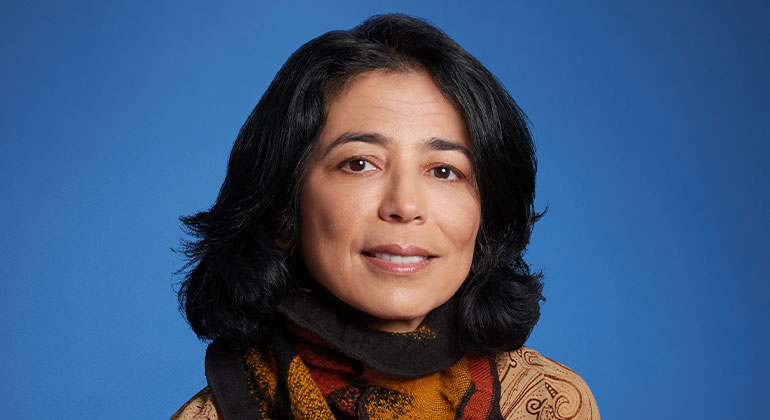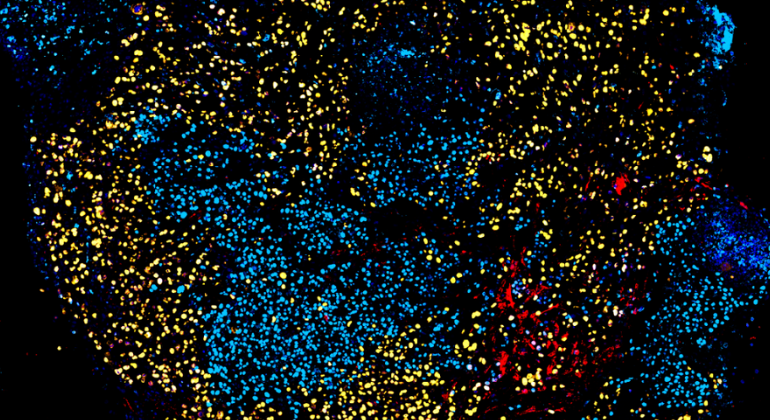Early Lung Cancer Coopts Immune Cell Into Helping Tumors Invade the Lungs, Mount Sinai Researchers Discover

Immune cells that normally repair tissues in the body can be fooled by tumors when cancer starts forming in the lungs and instead help the tumor become invasive, according to a surprising discovery reported by Mount Sinai scientists in Nature in June.
The researchers found that early-stage lung cancer tumors coopt the immune cells, known as tissue-resident macrophages, to help invade lung tissue. They also mapped out the process, or program, of how the macrophages allow a tumor to hurt the tissues the macrophage normally repairs. This process allows the tumor to hide from the immune system and proliferate into later, deadly stages of cancer.
Macrophages play a key role in shaping the tumor microenvironment, the ecosystem that surrounds tumors in the body. By investigating this microenvironment, researchers can find key players that drive tumor growth that can be tested as targets for immunotherapy. But modifying macrophages therapeutically has proven difficult.
In this study, scientists studied tissue samples from lung cancer tumors and surrounding lung tissue in 35 patients to see the role of macrophages in the development of the tumors.
The study’s lead author, Miriam Merad, MD, PhD, Director of the Precision Immunology Institute at the Icahn School of Medicine at Mount Sinai, and a multidisciplinary team of thoracic surgeons, pathologists, and medical oncologists within the Institute of Thoracic Oncology devised a comprehensive study that began when patients went into surgery to have cancerous lesions removed. The patients’ lung tumor samples, samples of surrounding healthy lung tissue, and blood samples were immediately analyzed on a cellular level at Mount Sinai’s Human Immune Monitoring Center to map out the immune system components they contained.
Researchers identified the macrophages at play in the early development of lung cancer, identifying a potential target for future drug development. They also found that the process that allows the macrophages to help tumors invade lung tissues is present in mice as well, which will allow them to manipulate the macrophages in future mouse models knowing that the manipulation is relevant to humans.
Half of all early-stage lung cancers relapse, and once they do and reach later stages, it is deadly and irreversible. Knowing how to attack the cancer at an early stage could have huge impacts on the number of patients relapsing and their overall survival.
“These findings are very important for Mount Sinai in the future as we have a very strong lung cancer screening program that identifies patients with early lung cancer lesions before they become fully invasive,” said Dr. Merad, who is also the Director of the Human Immune Monitoring Center and a member of the Institute of Thoracic Oncology and The Tisch Cancer Institute at Mount Sinai. “These findings will help devise immunoprevention strategies to prevent tumor progression in patients at risk by reprogramming macrophages and killing the tumor without surgery.”
About the Mount Sinai Health System
Mount Sinai Health System is one of the largest academic medical systems in the New York metro area, with 48,000 employees working across seven hospitals, more than 400 outpatient practices, more than 600 research and clinical labs, a school of nursing, and a leading school of medicine and graduate education. Mount Sinai advances health for all people, everywhere, by taking on the most complex health care challenges of our time—discovering and applying new scientific learning and knowledge; developing safer, more effective treatments; educating the next generation of medical leaders and innovators; and supporting local communities by delivering high-quality care to all who need it.
Through the integration of its hospitals, labs, and schools, Mount Sinai offers comprehensive health care solutions from birth through geriatrics, leveraging innovative approaches such as artificial intelligence and informatics while keeping patients’ medical and emotional needs at the center of all treatment. The Health System includes approximately 9,000 primary and specialty care physicians and 10 free-standing joint-venture centers throughout the five boroughs of New York City, Westchester, Long Island, and Florida. Hospitals within the System are consistently ranked by Newsweek’s® “The World’s Best Smart Hospitals, Best in State Hospitals, World Best Hospitals and Best Specialty Hospitals” and by U.S. News & World Report's® “Best Hospitals” and “Best Children’s Hospitals.” The Mount Sinai Hospital is on the U.S. News & World Report® “Best Hospitals” Honor Roll for 2025-2026.
For more information, visit https://www.mountsinai.org or find Mount Sinai on Facebook, Instagram, LinkedIn, X, and YouTube.
Researchers Discover Potential Boost to Immunotherapy
Mar 30, 2020 View All Press Releases

